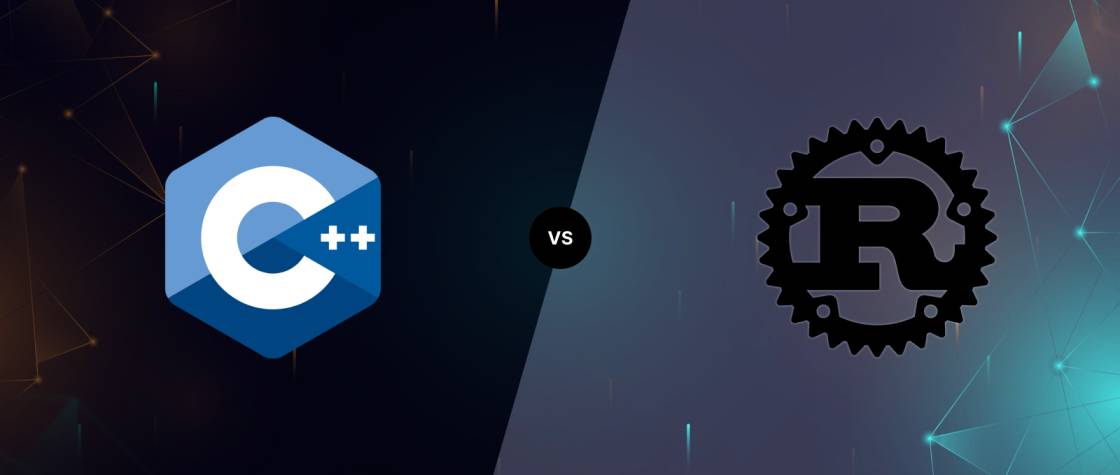Rust and C++ are the most popular and influential systems programming languages used today. People often look for Rust vs. C++ comparison due to their overlapping use cases for performance-critical applications like game engines, databases, operating systems, etc.
In this blog, we will compare Rust and C++ in detail on performance, safety, abstractions, ecosystem, learning curve, and more.
Introduction to Rust and C++
C++, developed by Bjarne Stroustrup in 1985, is an extension of the C programming language. It includes object-oriented features, generic programming features, and low-level memory manipulation capabilities. C++ is widely used in systems programming, game development, and applications requiring high-performance computations.
Rust, on the other hand, is a newer language, first released in 2010 by Graydon Hoare at Mozilla Research. Rust performs similarly to C++ but emphasizes memory safety, concurrency, and security. It aims to prevent common bugs in C and C++ programs, such as dangling pointers and data races, without sacrificing performance.
Rust Vs. C++: Key Differences
Here are some key differences in their design and capabilities.
Performance:
Both Rust and C++ are known for their high performance. They compile to native machine code and utilize low-level resource control for optimal speed.
Rust achieves excellent performance through zero-cost abstractions – its abstractions compile down to code that is as efficient as manual implementations. The ownership-based memory model also eliminates runtime overheads like garbage collection pauses.
C++ does not enforce any particular memory management model. The programmer must choose and implement the optimal strategy for each use case. This gives C++ an edge for extracting maximum performance if implemented properly.
Rust’s guaranteed safety makes the compiler’s output more consistent and more accessible to reason about. This can make Rust faster in developing reasonably optimized code compared to expert-level C++ optimizations.
For most practical programs, the performance differences between optimized Rust and C++ code are negligible. In some cases, like game development, C++’s maturity can provide more options to tweak performance.
Safety:
Safety is where Rust shines compared to most other systems languages. Rust’s compiler enforces strong guarantees around memory safety and concurrency.
The core concepts of ownership, borrowing, and lifetimes in Rust provide memory safety without any runtime cost. Rust does not allow null values or dangling pointers that are prevalent sources of bugs in C++.
C++ gives programmers much control over memory management and resource usage, but it is easy to introduce hard-to-find bugs and vulnerabilities if not written carefully. Undefined behavior in C++ can be catastrophic.
Rust prevents entire classes of bugs at compile time through its safety checks. It reduces the chances of vulnerabilities like buffer overflows and use-after-free significantly.
Rust also prevents data races by enforcing thread safety at compile time. Communication between threads requires explicit sync primitives.
Abstractions:
Rust provides high-level ergonomic abstractions that make the language very productive for systems programming despite its low-level nature.
Pattern matching with enums provides type-safe handling of different cases. Iterators, closures, and a functional code style are first class in Rust. It makes Rust feel almost like a high-level scripting language.
C++ offers basic abstraction features like classes, templates, and RAII (Resource Acquisition Is Initialization). However, they are considered more complex and error-prone than Rust’s abstractions.
Advanced template metaprogramming and concepts in modern C++ allow for building high-level safe APIs. But they have a much steeper learning curve compared to Rust’s traits and generics.
Ecosystem
C++ has a massive ecosystem developed over decades of the language’s existence. There are mature, feature-rich libraries for almost every domain and purpose.
Rust has a rapidly growing ecosystem, but it is still smaller than C++’s vast ecosystem. However, Rust benefits from easy interoperability with C libraries using FFI (Foreign Function Interface). This significantly expands the available ecosystem for Rust.
The Rust ecosystem is relatively mature, with libraries for everyday tasks like web servers, parsing, encoding, cryptography, etc. Domain-specific ecosystems are developing rapidly as well.
Learning Curve
C++ is notoriously difficult to master, with a steep learning curve spanning many years. The syntax and concepts in C++ have accumulated over decades and have inherent complexity.
Rust has often been criticized for having a steep initial learning curve. The ownership model is unique to Rust, and it takes time to work for programmers coming from other languages.
Once the core concepts click, Rust starts showing its strengths of safety and productivity. The compiler’s clear error messages guide the programmer to write idiomatic Rust code.
Overall, Rust is considered to have a steeper initial learning curve compared to other modern languages like Python or Go. However, it is a worthwhile investment considering the code quality and safety it provides.
Also Read: Comparison Between C# Vs. Java
Rust Vs. C++: Is Rust Better than C++?
Deciding between Rust vs. C++ depends on project-specific needs, developer expertise, and priorities. Rust offers unparalleled memory safety through its ownership model, reducing the risk of common bugs and security vulnerabilities inherent in manual memory management. This makes Rust an appealing choice for new projects where safety, concurrency, and performance are critical. However, C++ has a long-standing legacy in system programming, a vast ecosystem. It offers fine-grained control over system resources, making it ideal for projects that rely on its extensive libraries or where performance optimization at the lowest level is crucial.
The “better” language between Rust vs. C++ is, therefore, context-dependent. Rust’s steep learning curve may be a barrier for some teams, but it guarantees memory safety. Its modern tooling offers significant long-term benefits for projects that can accommodate the initial investment in learning. On the other hand, C++ remains indispensable in areas where its maturity, performance, and breadth of application have established deep roots. The choice should be guided by the specific requirements of the project, including factors like the targeted platform, performance criteria, and the available ecosystem for development.
Conclusion
Rust and C++ have different design goals and tradeoffs. For performance-critical applications with legacy codebases or niche domains like game engines, C++ still has advantages over Rust.
However, for new projects without legacy constraints, Rust has emerged as a clear choice compared to C++ due to its focus on safety, productivity, and maintainability. The learning curve investment pays off manifold in terms of reduced bugs and developer productivity.
Rust is the future for systems programming with its modern, safe design. But C++ will stay relevant for its unique strengths in various domains. The choice between Rust and C++ ultimately depends on the specific requirements of the project at hand.


